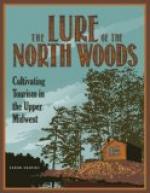Winter is not a good time for prospecting, but travel is often easier then, for the hand-sledges run smoothly on the snow that covers fallen trunks and underbrush and levels the hollows. The muskegs are frozen and one can make fast marches along the rivers and across the lakes. Thirlwell had no tent, but it is not a great hardship for a well-fed man, wrapped in furs, to sleep beside a big fire behind a bank of snow, and he had no misadventures as he pushed into the wilds. The ore proved to be worthless, and soon after he started back he met an Indian who said he had seen Father Lucien going south with a dog-team two days before, and had found the trail of another white man near the spot where he and his friends had camped.
The clear, cold weather broke when Thirlwell began his homeward march. The sky was low and leaden, and a biting wind blew from the south. It drove the snow-dust into the men’s smarting faces and froze their breath on their furs. Their hands stiffened on the sledge-traces and their feet got numb. The cold got worse when snow began to fall and when they camped one night Thirlwell noted that they had used more food than he thought. The transport of provisions is perhaps the main difficulty of a winter journey in the bush, for men who brave the arctic cold must be generously fed. Thirlwell, however, expected to reach the mine before their stores ran out, and set off at daybreak next morning in heavy, driving snow.
At dusk he camped in a clump of dry willows by a river. The snow had stopped, but a bitter wind blew down the valley and the cold was intense. When he had eaten a meal Thirlwell sat with his back to a snow bank and a big fire in front, holding up a moccasin to the blaze. This was necessary because moccasins absorb moisture during a long day’s march, and the man who puts them on while damp risks getting frozen feet.
He was lighting his pipe when the Metis he had sent out for wood came back with an armful of branches and said he had seen a light up the river. Thirlwell put on his half-dried moccasins and reluctantly left the camp. He had met nobody but an Indian on the trail and was curious to know who was camping in those solitudes. Besides, it was possible that he might be able to get some supplies.
As he pushed through the willows the savage wind pierced him to the bone. The dry branches rattled and the pines upon the ridge above wailed drearily. The sky was clear and the frozen river, running back, white and level, through the dusky forest, glittered in the light of a half moon. This was all that Thirlwell saw for a few minutes, and then a twinkling light in the distance fixed his attention. It flickered, got brighter, and faded, and he knew it was a fire.
After a time he and the Metis left the river and climbed the steep bank. The fire had vanished, but the pungent smell of burning wood came down the biting wind, and by and by trails of smoke drifted past the scattered pines. Then as they struggled through a brake of wild-fruit canes a blaze leaped up among the the rocks and he saw an indistinct figure crouching beside a fire. The figure got up awkwardly and a few moments later Father Lucien gave Thirlwell his hand. The light touched his thin frost-browned face, which was marked by lines that pain had drawn.




